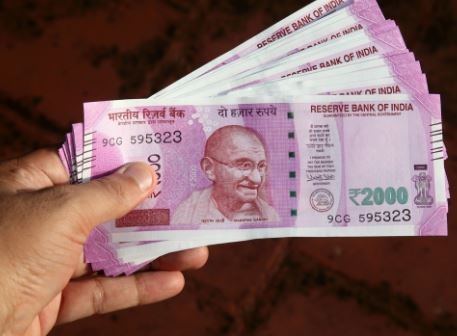IANS Photo

Life at the time of demonetisation in Nagaland - II
Moa Jamir
Dimapur | November 20
The demonetization move by the central government has created chaos across the country. Nagaland is no exception, and places in the interiors are facing the brunt of the problem. Here are a few examples.
For instance, in New Riphyim Village under Wokha District, the nearest bank is 14 km away in Wokha Town. For old people either without a bank account or unable to visit a bank, a noble initiative by Green Team, an organisation based in the village, has come to rescue. The team distributed around Rs. 40,000-50,000 in lower denomination in the village.
Speaking to The Morung Express, Green Team Leader Steve Odyuo said that when the announcement was made, the team, whose members include small businesses and VDB secretaries, collected the money among themselves to assist needy people.
However, they ran out of change by the second day.
“Giving them the new Rs. 2000 was a problem as the villagers want the money they are familiar with,” Odyuo said adding that the team is trying to sensitize people through the village council and the churches.
In Wokha Town, many shop keepers are either turning their customers away or giving goods on credit. “Business is down 70-80 percent, it is on a standstill,” a retailer from the town maintained.
Exam has started and paying fees for the schools has become a big hassle for many parents. Even daily workers are affected as people do not have change to pay, Odyuo added.
In Mon, when the implications of demonetization set in, many from the rural areas thronged the lone SBI Bank in Mon Town. In one such incident, a restless crowd managed to tear down the revolving Iron Gate at the bank entrance.
Anxiety is more in rural areas, especially in the Lower Konyak areas, where coal business is big and the season has just started. Mon has also witnessed a lot of elderly people coming from the rural areas with a lot of money but without an account or proper identity.
In Zunheboto as well, the situation is grim. Hanjon Yunshi L Jakha, a town resident informed that the lone ATM in the town is not functioning properly and the new Rs 2000 is practically useless.
People without ATM cards are also facing problems, since banks insist on depositing only through ATMs, he claimed, while narrating an incident he faced while assisting an old man deposit his Rs. 4000.
“After filling up the deposit form I told him to stand in a queue. When his turn came, the bank official demanded his ATM card so he called me to talk with the official since he doesn’t have one. The officer at the counter refused to accept the money without ATM card.”
In Mokokchung district, those involved in informal business in the border areas are facing the brunt. The arrival of the Rs 2000 note has created a new predicament, said one Tuli Town resident. “With the Rs 2000 notes, people are going to shops but insist on new notes of lower denomination from the owner. This is creating a deadlock.”
A Nagaland State Co-operative Bank employee from Tuli said that people coming from the villages are facing lot of problem. “For those without an account, we are opening new one with KYC compliant. But we are rationing withdrawal limit to 4000 to ensure equity in distribution,” he added.
In Longleng, trade in the foothills bordering Assam has been affected, despite this being the best time for business, said Dr B Henshet Phom.
While majority of the people are happy and expecting a corruption free India, Longleng is also facing shortage of meat import from Assam as there is no supply due to demonetisation, he informed.
In Tuensang, Gabriel Moses Hongang, narrated an incident of a man from a far away village who came with his sick son but had to leave his son unattended at a pharmacy and rush to a bank, as the shopkeeper would not accept old currency.
In another case, a school initially did not accept fees in old notes but when it realised that no one was paying the fees, a 'notice' was put up saying old currency notes were accepted.
In Dimapur, a soon to be hitched gentleman went to a bank to withdraw quick cash for emergency shopping.
“I went to a bank early in the hope of getting ‘change’ instead of the crisp Rs 2000 note which, though legal, is more problematic. Along with the 2000 notes, I got the change in the form of Rs. 10 coins. I left the bank with all my pockets full of coins. Luckily I was spared of the long queue ritualistic ordeal.”
In Kiphire, which has only two banks, there was a reported fight between an irate customer and a shopkeeper for the lack of change. This incident led to a shopkeepers association holding a strike by closing all shops on November 18.
With restricted cash and daily needs, people are going through a rough patch with everyone having questions without answers, said Yangtsapila Yanglih, a Town Citizen.
“At this juncture, I only hope and pray no emergency situation arise where there need for huge sum of money.”
Despite the huge rush for cash created by the demonetization move, by the end of the week crowds in the banks lessened as most banks issued out only Rs. 2000 notes. ATMs were also either vacant or closed due to same problem.






